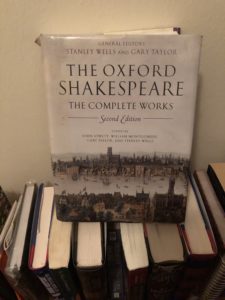Welcome to the cKotch.Com blog. I’m Christopher Kotcher, and this is how a challenge shaped my knowledge of the greatest English writer.

Summer Reading, Summer Wager
In the summer after high school, Dante’s Divine Comedy made me a reader. I finished the first wave of my new reading list before my summer was even half over.
Much of Homer. All of Poe. All of Arthur Conan Doyles’ Sherlock Holmes.
Next summer, I went to Barnes and Noble to grab a new wave of classics. Among them was a complete collection of the William Shakespeare. All his poems, and all his plays.
I first cracked open the collection when sitting outside one fine June day with my maternal grandma.
She took one look at my book and broke out in laughter. The font was so tiny she could not make out any words, and the book was still a behemoth to behold.
Grandma said I would take a year to finish that book. I laughed and bet I could finish the whole thing by month’s end.
Grandma waved her hand. She assumed I had to be joking.
I was not.
Reading All Through June

The month was still young. I would have plenty of time if I planned things out.
All the sonnets were grouped together in the middle of the book. I could split them across two days.
The plays would prove more challenging. My only chance would be reading a full play per day.
So, I did what I had to do. I embarked on my most ambitious self-imposed reading schedule to this very day.
Most plays were divided into five acts. I would read these individual acts throughout the day. I structured whole days around them.
Typical pattern involved reading the first act after I got out of bed. Then I would play some video games before reading the second act. Third act would come some point sitting outside. Fourth and fifth acts would alternate with some light TV time to end the day.
Only things which really messed with my reading schedule were mowing the lawn or grocery shopping. Still, these were only minor hiccups here and there.
I look back now amazed at how well I stuck to that schedule for a whole month. I suppose that would speak to the power of the bard.
Shakespeare’s style was always his own, but there was also just enough variety to keep things from getting stale.
Subtle things, you know? Stuff as simple as changing which character types bounce off each other or how their lines communicated their characters.
Even works I had already read during high school seemed to take on new life. Family dynamics in Hamlet intrigued me far more than before. Lady Macbeth seemed more complex than in my previous time with Macbeth.
Challenge Completed
Grandma saw me always reading that massive book. She laughed every time. She remained certain I could not finish it before month’s end.
I guess she never noticed my bookmark steadily moving through the pages.
Then Grandma was sitting on the couch one fine day. I walked up and plopped my big old Shakespeare book dead center on her tray table.
I told her, loud and clear, “Done!”
She laughed a little harder and said she could not believe it.
That good laugh between us was all the trophy my victory needed.
With two days to spare, I had read all of Shakespeare by the end of the month. I expected this achievement to do great things for me. All of Shakespeare was now at my fingertips.
A Price for Everything
Surprisingly, my first real chance to show off my knowledge of Shakespeare would not come for a few more years.
Any English classes which covered Shakespeare only really talked about the works featured in the class. I never had a chance to discuss his other works.
My chance came later in one of my college honors courses.
The professor was linking various ideas of western thought to the ancient Greek philosopher Socrates. Soon enough, the professor reached Shakespeare.
The professor asked me and the class’s other English major how Shakespeare’s play The Tempest could be linked to Socratic ideas.
The other English major did not know. Her English classes had focused more on Shakespeare’s contemporaries than on Shakespeare himself.
Now was my time to shine.
And yet, I could not think of an answer for the question. Nothing came to me though I had already read all of Shakespeare.
I remembered there was a shipwreck, but I remembered none of the storm’s true mystical nature or the plotting of Prospero.
That silenced me for a few good moments.
True, it had been a bit since I had read Shakespeare. Still, other works had stuck with me. I can discuss Plato now at least as well as I could during college. I remember fairly well which of King Arthur’s knights went on which quests.
Why would be Shakespeare be any different?
I pondered the question for a while. Then something strange happened.
I stumbled into another conversation about Shakespeare.
This time, I was talking with classmates taking a Shakespeare class. They were trying to remember themes and archetypes from Shakespeare’s works.
Somehow, I could not only follow along, I could actually contribute. I was able to join their conversation and add a few insights once given a few details.
I knew how Shakespeare handled tricksters and schemers. I knew how he used fools to either break or increase tension.
This conversation gave me my answer to why my relationship with Shakespeare was so different from other writers.
By reading everything so close together, the man’s works blended together in my mind. I could talk about general features of his craft, but I hardly remembered any specifics anymore.
Still, when given some specifics, I could access enough memories of a particular work to attach it to Shakespeare’s general trends.
I supposed you could say I would be a good participant in a conversation on Shakespeare, but I would not be a good initiator of one. At least, not without some preparation.
Scattered Inspiration
Considering my strange relationship with Shakespeare, I suppose it is no surprise that any Shakespearean inspiration in my works would also feel a bit odd.
For most things, I can point to specific points of inspiration in any work. I can analyze what I have taken and explain how I have found a way to make the core idea my own.
For Shakespeare, I can never really know where the inspiration ultimately comes from. I could probably point to the general theme as usual, but I could not say which example of that theme especially resonated with me.
I suppose there are some advantages. For one, if I am adding a general theme or character type, then it is far easier to make it my own. I do not run the risk of creating something too close to its inspiration.
Kotcher’s Call to Action
If you like my content and wish to see more, then you have a few options.
You could check out my book Good Stuff: 50 Poems from Youth on Amazon. Good Stuff is enrolled in the Kindle Matchbook program, so anyone who buys the paperback can also get the eBook for free.
You can also check my Essential Posts page for links to some of my greatest posts to the cKotch.Com blog.
Finally, be sure to like my Facebook page and share it with your friends. I post a link there whenever a new blog post goes live each Friday at 5:00 PM EST.